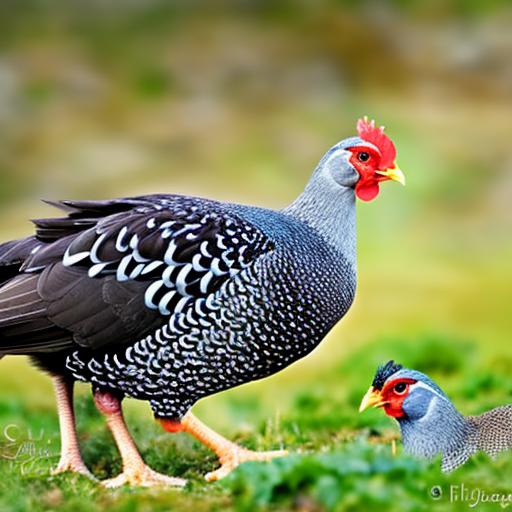Keeping chickens and guinea fowl together can be a rewarding experience for poultry enthusiasts. Both chickens and guinea fowl are popular choices for backyard flocks due to their ability to provide eggs, pest control, and entertainment. While they have some differences in terms of behavior and care requirements, they can coexist peacefully when provided with the right environment and management. In this article, we will explore the compatibility of chickens and guinea fowl, suitable housing and space requirements, feeding and nutrition needs, health and disease prevention, as well as behavioral issues and pecking order dynamics. By understanding these aspects, poultry keepers can successfully integrate chickens and guinea fowl into a harmonious flock.
Key Takeaways
- Chickens and guinea fowl can be kept together, but it’s important to understand their compatibility and provide suitable housing and space.
- Chickens and guinea fowl have different dietary needs, so it’s important to provide a balanced diet for both species.
- Proper management of health and disease prevention is crucial for keeping chickens and guinea fowl healthy.
- Addressing behavioral issues and establishing a pecking order is important for maintaining harmony within the flock.
- Successfully keeping chickens and guinea fowl together requires careful consideration of their needs and proactive management of their environment.
Understanding the Compatibility of Chickens and Guinea Fowl
Chickens and guinea fowl are generally compatible when kept together, but it’s important to understand their differences in behavior and social structure. Chickens are known for their social nature and tend to form a pecking order within the flock. They are also more domesticated and rely on humans for food and shelter. On the other hand, guinea fowl are more independent and have a strong instinct for foraging and pest control. They are also known for their loud calls and alert nature, which can make them excellent watchdogs for the flock. When introducing guinea fowl to an existing chicken flock, it’s important to do so gradually to minimize stress and aggression. Providing multiple feeding and watering stations can also help reduce competition and aggression between the two species. Overall, with proper management and understanding of their differences, chickens and guinea fowl can coexist peacefully in the same flock.
Providing Suitable Housing and Space for Chickens and Guinea Fowl
When keeping chickens and guinea fowl together, it’s essential to provide suitable housing and space to accommodate both species’ needs. The coop should be spacious enough to allow for roosting space, nesting boxes, and dust bathing areas for the chickens, while also providing perches and sheltered areas for the guinea fowl. Additionally, the coop should have adequate ventilation to prevent moisture buildup and respiratory issues. Outdoor space is equally important, as both chickens and guinea fowl require room to forage, dust bathe, and exercise. Providing a secure outdoor run with plenty of vegetation and hiding spots can help reduce aggression and territorial behavior between the two species. It’s also important to consider predator-proofing the coop and run to protect the flock from potential threats. By providing ample housing and space for both chickens and guinea fowl, poultry keepers can ensure a harmonious living environment for their flock.
Feeding and Nutrition for Chickens and Guinea Fowl
Feeding and nutrition play a crucial role in maintaining the health and well-being of chickens and guinea fowl. While both species have similar dietary requirements, there are some differences that need to be considered when feeding them together. Chickens are omnivores and can thrive on a diet of commercial poultry feed supplemented with kitchen scraps, grains, and occasional treats. They also require access to grit for proper digestion, especially if they are allowed to free-range. On the other hand, guinea fowl are more inclined towards insect-based diets and require higher protein levels compared to chickens. Providing a balanced diet that includes game bird or turkey starter feed, along with access to insects, seeds, and vegetation, can help meet the nutritional needs of guinea fowl. It’s important to provide separate feeding stations to prevent competition and ensure that both species have access to their specific dietary requirements. Additionally, offering oyster shell or crushed eggshells can help supplement calcium for both chickens and guinea fowl. By understanding their nutritional needs and providing a balanced diet, poultry keepers can support the overall health and productivity of their mixed flock.
Managing Health and Disease Prevention for Chickens and Guinea Fowl
Maintaining the health of chickens and guinea fowl is essential for a successful mixed flock. Both species are susceptible to common poultry diseases such as respiratory infections, parasites, and nutritional deficiencies. Regular health checks, proper sanitation, and biosecurity measures are crucial in preventing the spread of diseases within the flock. It’s important to provide clean bedding, regular coop cleaning, and access to fresh water to minimize the risk of disease transmission. Additionally, monitoring the flock for any signs of illness or abnormal behavior can help identify potential health issues early on. Vaccinations may also be necessary depending on the prevalence of certain diseases in the area. When introducing new birds to the flock, quarantine measures should be implemented to prevent the introduction of any contagious diseases. By practicing good hygiene, monitoring flock health, and implementing disease prevention measures, poultry keepers can help ensure the overall well-being of their mixed flock.
Addressing Behavioral Issues and Pecking Order

Behavioral issues such as aggression, bullying, and establishing a pecking order can arise when keeping chickens and guinea fowl together. Chickens are known for their hierarchical social structure, where dominant individuals establish their rank through pecking and aggressive behavior. When introducing guinea fowl to an existing chicken flock, it’s important to monitor their interactions closely to prevent any aggressive behavior or bullying. Providing multiple feeding stations, perches, and hiding spots can help reduce competition and aggression within the flock. Additionally, ensuring that there is enough space for both species to establish their territories can help minimize conflicts. It’s also important to observe the flock dynamics regularly and intervene if any bird shows signs of distress or injury. By addressing behavioral issues early on and providing a well-structured environment, poultry keepers can help maintain a peaceful coexistence between chickens and guinea fowl.
Conclusion and Tips for Successfully Keeping Chickens and Guinea Fowl Together
In conclusion, keeping chickens and guinea fowl together can be a rewarding experience when managed properly. Understanding their compatibility, providing suitable housing and space, meeting their nutritional needs, managing health and disease prevention, as well as addressing behavioral issues are essential aspects of successfully integrating these two species into a harmonious mixed flock. By considering their differences in behavior and care requirements, poultry keepers can create an environment where both chickens and guinea fowl can thrive together. Some tips for successfully keeping chickens and guinea fowl together include providing multiple feeding stations, ensuring adequate space for both species, monitoring flock dynamics regularly, practicing good hygiene, implementing disease prevention measures, and addressing any behavioral issues promptly. With proper management and care, chickens and guinea fowl can coexist peacefully in the same flock, providing eggs, pest control, and entertainment for poultry enthusiasts.
If you’re considering keeping chickens and guinea fowl together, it’s important to understand their compatibility and potential benefits. According to a recent article on PoultryWizard, “Can Geese Eat Chicken Feed?” explores the dietary considerations for different poultry species cohabitating. Understanding the nutritional needs of each bird is crucial for maintaining their health and well-being. Check out the article for valuable insights on feeding practices when keeping multiple types of poultry together.
FAQs
Can chickens and guinea fowl be kept together?
Yes, chickens and guinea fowl can be kept together in the same coop and run. They generally get along well and can even help protect each other from predators.
What are the benefits of keeping chickens and guinea fowl together?
Keeping chickens and guinea fowl together can provide mutual protection from predators, as guinea fowl are known for their loud alarm calls. Additionally, they can help control pests in the area, such as ticks and insects.
Are there any drawbacks to keeping chickens and guinea fowl together?
One potential drawback is that guinea fowl can be more aggressive than chickens, especially during mating season. They may also be more prone to wandering off and can be noisy, which may not be suitable for all environments.
What should be considered when housing chickens and guinea fowl together?
When housing chickens and guinea fowl together, it’s important to provide enough space for both species to roam and forage. Additionally, providing separate nesting areas can help prevent competition for nesting spots.
Do chickens and guinea fowl have similar dietary needs?
Chickens and guinea fowl have similar dietary needs and can be fed the same type of poultry feed. However, guinea fowl may also require access to more insects and greens in their diet.
How can I introduce chickens and guinea fowl to each other?
When introducing chickens and guinea fowl, it’s best to do so when they are young and can grow up together. If introducing adult birds, it’s important to monitor their interactions and provide enough space for them to establish a pecking order.
Meet Walter, the feathered-friend fanatic of Florida! Nestled in the sunshine state, Walter struts through life with his feathered companions, clucking his way to happiness. With a coop that’s fancier than a five-star hotel, he’s the Don Juan of the chicken world. When he’s not teaching his hens to do the cha-cha, you’ll find him in a heated debate with his prized rooster, Sir Clucks-a-Lot. Walter’s poultry passion is no yolk; he’s the sunny-side-up guy you never knew you needed in your flock of friends!







